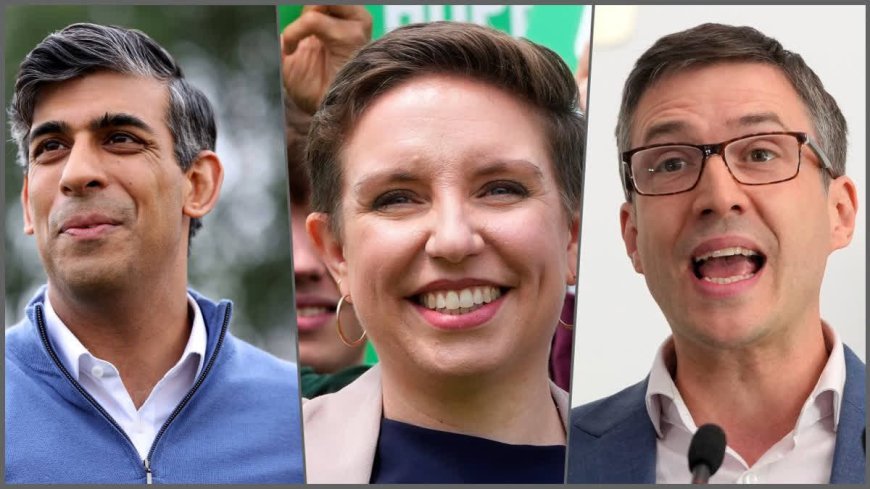UK Election 2024: Key Players and Policies in Focus

With millions of Britons heading to the polls this Thursday, the United Kingdom is gearing up for a pivotal national election that will determine the composition of the next House of Commons and the country’s leadership. Here’s a comprehensive look at the major parties, their leaders, and their electoral promises:
Conservative Party - Prime Minister Rishi Sunak Prime Minister Rishi Sunak, 44, faces a tough battle to retain power after leading the Conservative Party through a turbulent period since 2022. Sunak, Britain’s first leader of color and a former Goldman Sachs executive, emphasizes economic stability but has drawn criticism for his disconnect with ordinary voters. The Conservatives, who currently hold 365 seats, pledge to strengthen the economy, cut taxes by £17 billion annually, and boost defense spending to 2.5% of GDP by 2030. They also advocate for stricter immigration controls and reductions in welfare spending.
Labour Party - Leader Keir Starmer Labour, under the leadership of 61-year-old Keir Starmer, presents itself as a centrist alternative poised to end the Conservatives’ 14-year rule. Starmer, a former chief prosecutor, has steered the party towards moderate policies, distancing itself from the more socialist agenda of his predecessor Jeremy Corbyn. Labour’s agenda includes promoting wealth creation, enhancing infrastructure with a decade-long strategy, and implementing a windfall tax on oil and gas companies to fund a state-owned clean energy initiative. They also aim to tackle public health challenges and address record-high waiting times.
Liberal Democrats - Leader Ed Davey Led by Ed Davey, 58, the Liberal Democrats, with 11 seats, aim to make significant strides in health and social care reforms, including introducing free nursing care and investing in renewable energy and home insulation. Davey, previously a government minister under a coalition with the Conservatives, emphasizes environmental sustainability and youth empowerment by lowering the voting age to 16. The party advocates rejoining the EU’s single market and addressing environmental concerns such as sewage dumping.
Reform UK - Leader Nigel Farage Nigel Farage, a prominent figure in British politics known for his anti-migrant stance and advocacy for Brexit, leads Reform UK, which gained its first seat earlier this year through a defection. Farage’s party proposes freezing “nonessential immigration,” withdrawing from the European Convention on Human Rights, and scrapping net-zero emission targets to reduce energy costs. Reform UK appeals to disillusioned Conservative voters seeking a harder line on immigration and nationalist policies.
Scottish National Party - Leader John Swinney In Scotland, the Scottish National Party (SNP), led by John Swinney, seeks to capitalize on growing support for independence and environmental issues. With 48 seats, the SNP advocates reopening discussions for Scottish independence, rejoining the EU, and increasing public health funding. Swinney, who assumed leadership following Nicola Sturgeon’s departure, also aims to dismantle the UK’s nuclear deterrent and promote global peace initiatives.
Green Party - Co-Leaders Carla Denyer and Adrian Ramsay The Green Party, represented by Carla Denyer and Adrian Ramsay, emphasizes environmental policies, including phasing out nuclear power and achieving net-zero emissions by 2040. The party’s platform includes substantial investments in green technologies and home insulation, funded through a combination of carbon taxes and increased taxes on the wealthy and high earners. With one current seat, the Greens are positioning themselves as champions of sustainability and social justice.
As the election approaches, these parties vie for voter support in a landscape shaped by Brexit, economic recovery, and environmental challenges. With diverse platforms and leadership styles, the outcome of Thursday’s election promises to define Britain’s trajectory in the coming years.













































